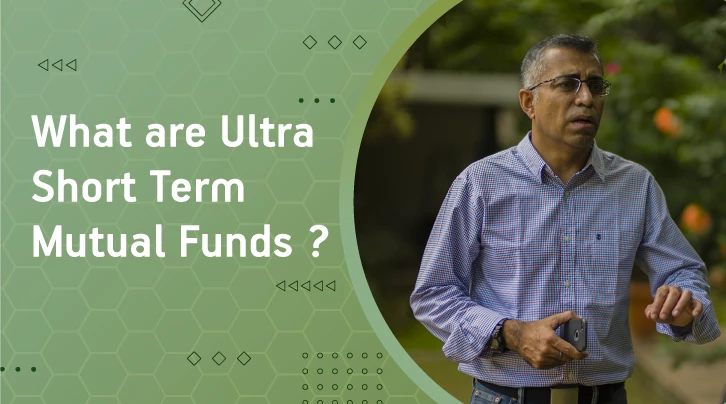Summary
If you'd like to invest in mutual funds for 3-6 months, ultra-short-term mutual funds can be an option. Check out this post to know what they are, how they work, and more.
Content
Debt funds are a preferred choice for investors with a lower risk appetite. But to further facilitate fund selection, SEBI has classified debt funds into 16 different categories. For investors with a lower risk appetite and investment horizon of 3-6 months, debt funds like ultra short-term funds can be worth investing in.
But what are these ultra-short-term mutual funds? Let’s try to understand these schemes in detail-
What are Ultra Short-Term Funds?
Ultra short-term or short-duration funds are schemes that invest in debt and money market securities with a Macaulay duration of 3-6 months. In other words, the weighted average term within which the portfolio components of an ultra-short duration scheme receive cash flows is 3-6 months.
As these schemes generally have lower potential volatility and can deliver potentially stable returns over a shorter tenure, they can be an ideal investment vehicle for conservative investors to park their surplus money.
How Do Ultra Short-Term Funds Work?
Based on the scheme objective, the fund managers of ultra-short mutual funds invest in debt and money market securities with a Macaulay duration of 3-6 months. While these schemes offer decent protection against interest rate risk, they’re susceptible to market fluctuations.
But while these funds are placed slightly higher in the risk spectrum compared to debt funds like liquid funds, they’re still one of the lowest-risk mutual funds. Moreover, the potential returns from short-term funds are generally higher than liquid funds.
Who Should Invest in Ultra Short-Term Mutual Funds?
In most cases, people deposit the surplus money in a savings bank account to generate interest income. But by investing money in the best ultra-short mutual funds, you can generate potentially higher returns.
So, these schemes are ideal for any conservative investor who wants to invest for a tenure of 3-6 months to generate returns higher than savings accounts and schemes like liquid funds. Moreover, it can also be considered by other investors wanting to build a well-diversified portfolio.
What are the Factors You Should Consider Before Investing in Ultra Short-Term Funds?
Here are some factors investors should consider before investing in this fund type.
-
Investment Risk
Due to the shorter tenure, these schemes are mostly protected against interest rate risks. However, based on the investment decisions made by the fund manager, the scheme could have potential credit risks.
Moreover, if Government securities or G-Secs are added to the scheme portfolio, it could also increase its volatility.
What Should You Do?
Investors should carefully analyze the fund manager's investment strategy and past scheme performance to understand the investment risks better.
-
Expense Ratio and Exit Load
The expense ratio is a fee charged by AMCs (Asset Management Companies). While SEBI has capped the expense ratio for all the mutual fund categories, the ratio can vary between schemes within the prescribed limit.
Moreover, some ultra short-term schemes also have an exit load to stabilize the scheme.
What Should You Do?
Before investing in an ultra short-term MF, check its expense ratio and exit load, as it’ll directly impact the returns you generate from the scheme.
-
Investment Tenure
Ultra short-term funds are ideal for investment tenures of 3-6 months. If your investment horizon is less than 3 months, you can consider other options like liquid funds.
However, if you want to invest for 6-12 months, there are schemes like low-duration funds and money market funds that could better suit your objectives.
What Should You Do?
Ensure you thoroughly analysxe your investment objective and horizon before investing to minimize risk.
How are Gains from Ultra Short-Term Schemes Taxed?
The gains from any ultra-short-term mutual fund investment are taxed based on the holding period.
The gains made within 3 years of investment in this scheme are known as STCG (Short-Term Capital Gains).
But if the investment was held for more than 3 years, the gains will be treated as LTCG (Long-Term Capital Gains)
STCG from the scheme is added to the investor’s taxable income and taxed as per their tax slab. But LTCG is taxed at 20% with indexation and 10% without indexation.
How to Invest in Ultra-Short-Term Mutual Funds?
Leading AMCs now allow investors to invest in these funds or any other mutual fund scheme online. Follow these steps-
-
Visit the official AMC website
-
Search for the ultra-short-term scheme you’re interested in
-
Check the scheme’s offer document and other details
-
Complete online KYC
-
Invest a lump sum amount or start a SIP (Systematic Investment Plan)
The minimum investment amount of most ultra short-term funds is Rs 1,000.
Achieving Financial Goals with Ultra Short-Term Mutual Funds
If your investment horizon is 3-6 months and your goal is to generate returns potentially higher than liquid funds or a savings bank account, ultra-short-term funds can be a good choice. But as no mutual fund is risk-free and the returns are not guaranteed, ensure you thoroughly understand these funds and their risk profile before investing.
Investors can consult an investment advisor before investing to avoid unnecessary risks and choose schemes that better align with their objectives and risk appetite.
Mutual Fund investments are subject to market risks, read all scheme related documents carefully.





 1800-270-7000
1800-270-7000




